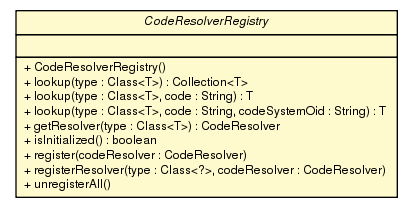
|
||||||||||
| PREV CLASS NEXT CLASS | FRAMES NO FRAMES | |||||||||
| SUMMARY: NESTED | FIELD | CONSTR | METHOD | DETAIL: FIELD | CONSTR | METHOD | |||||||||

java.lang.Objectca.infoway.messagebuilder.resolver.CodeResolverRegistry
public abstract class CodeResolverRegistry
This class functions is generally used in one of two ways. Either:
register(codeResolver) method and set the instance
static variable.
Additionally, this class can automatically resolve:
In both cases the class or enum must implement the Code interface.
| Constructor Summary | |
|---|---|
CodeResolverRegistry()
|
|
| Method Summary | ||
|---|---|---|
static
|
getResolver(Class<T> type)
Gets the resolver. |
|
static boolean |
isInitialized()
Checks if is initialized. |
|
static
|
lookup(Class<T> type)
Lookup. |
|
static
|
lookup(Class<T> type,
String code)
Lookup. |
|
static
|
lookup(Class<T> type,
String code,
String codeSystemOid)
Lookup. |
|
static void |
register(CodeResolver codeResolver)
Register. |
|
static void |
registerResolver(Class<? extends Code> type,
CodeResolver codeResolver)
Register resolver. |
|
static void |
unregisterAll()
Unregister all. |
|
| Methods inherited from class java.lang.Object |
|---|
clone, equals, finalize, getClass, hashCode, notify, notifyAll, toString, wait, wait, wait |
| Constructor Detail |
|---|
public CodeResolverRegistry()
| Method Detail |
|---|
public static <T extends Code> Collection<T> lookup(Class<T> type)
Lookup.
T - the generic typetype - the type
public static <T extends Code> T lookup(Class<T> type,
String code)
Lookup.
T - the generic typetype - the typecode - the code
public static <T extends Code> T lookup(Class<T> type,
String code,
String codeSystemOid)
Lookup.
T - the generic typetype - the typecode - the codecodeSystemOid - the code system oid
public static <T extends Code> CodeResolver getResolver(Class<T> type)
Gets the resolver.
T - the generic typetype - the type
public static boolean isInitialized()
Checks if is initialized.
public static void register(CodeResolver codeResolver)
Register.
codeResolver - the code resolver
public static void registerResolver(Class<? extends Code> type,
CodeResolver codeResolver)
Register resolver.
type - the typecodeResolver - the code resolverpublic static void unregisterAll()
Unregister all.
|
||||||||||
| PREV CLASS NEXT CLASS | FRAMES NO FRAMES | |||||||||
| SUMMARY: NESTED | FIELD | CONSTR | METHOD | DETAIL: FIELD | CONSTR | METHOD | |||||||||